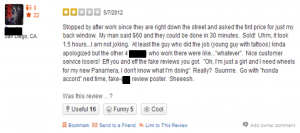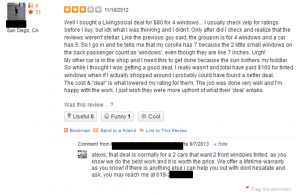When I turned 16, my parents and I headed to a local car dealership for my first car. Because we were purchasing it new, I was able to pick out the color I wanted. I thought black cars looked chic, so I was set on a black car. My parents tried to convince me to go with a lighter color because it shows less dirt, scratches, and dings and the inside stays cooler, but being a typical 16 year old girl, I would not listen. Several years passed without regretting the black color choice, until I moved to Tucson, Arizona to attend college at the University of Arizona. Well for anyone who has 1) ever been in Arizona during the summer and 2) has a dark colored car, probably knows where this is headed. For those of you who do not know, let me break it down for you: black cars + over 110 degree weather = VERY scorching hot seats and steering wheel. By this point, I was convinced I needed my windows tinted to help with the heat.
Flash forward to a few weeks ago, my dad forwarded an email to me from Amazon Local. Since I was curious, I decided to look through and see the local deals they were offering. As I was scrolling through the email, one particular deal caught my eye: window tinting. I copied the company name, pasted into Google, and pulled up their Yelp page. I was surprised to see that all of the positive comments looked bogus and all the negative comments looked like real customers. I was immediately turned off and decided to forgo purchasing the window tinting deal. Even with the “positive” reviews, I was a little suspicious because the company did not come across as trustworthy.
When I mentioned this to my dad, he sent me a text message with a link to an USA Today article. This article was titled “Undercover crackdown on phony online reviews”. To summarize, this article told a story in which potential customers, who owned a yogurt shop in Brooklyn, reached out to Internet search engine optimization companies to counteract negative online reviews posted by customers. Some of the companies willingly agreed to write fake, yet positive, reviews; however, little to the their surprise, the owners of the yogurt shop turned out to be New York State Attorney General’s office investigators who were working to crackdown on bogus online reviews. In the end, 19 companies agreed to pay fines for violating state laws against false advertising.
As marketers, we understand the importance of ethics. We also know there are state and federal laws which prohibit us from doing certain things that come across as unfair to consumers, and yet, we still hear the horror stories of companies taking the plunge and getting in trouble. According to research from Businessweek, 70% of individuals consult reviews and ratings before making a purchase. This means customers visit websites such as Yelp, Google Local, and Citysearch in order to make a purchasing decision. With over half of all individuals consulting popular review websites, it is perfectly logical that companies would want glowing reviews written about them. It may seem as if posting these fake reviews will help to attract more customers, but how will it affect brand image when customers, such as me, are able to read between the lines and determine a fake post versus a real post?
After reading the window tinting company’s online reviews, I saw them as an irresponsible and untrustworthy company because they took the easy way out. Reviews not only benefit potential customers by aiding with their purchasing decisions, but they also benefit the companies. Reviews are an honest reflection from customers, and thus, companies can use this information for improvement. Instead of focusing time on counteracting negative reviews, companies should reply back. By doing so, this shows the customers that the company actually cares. I believe it is so much easier to counteract negative reviews by posting fake and positive reviews, but why would I want to support a company that would do so? If there are willing to take the easy way out with their online reviews, does that mean they would be willing do the same with the window tinting job on my car?
I honestly think companies do not understand the overall harmful effects that fake reviews can cause. Humans are not stupid; they can, and will, connect the dots themselves. We know it is much worse for consumers to connect the dots themselves since they have the tendency to be more negative. Instead, companies should be transparent and have open communication in order to stop customers from connecting the dots. Sure, a company might have negative online reviews, so let me ask this. What looks worse: A company with negative online reviews along with positive reviews that are clearly fake or a company with negative online reviews and the owners comment back in a sincere way? Personally, I believe the latter looks much more professional and respectable. This leads me to believe fake reviews do not work because there are many other things companies can do to overcome the fake reviews in a more successful and sincere way.
Source: http://socialmediatoday.com/sector45/1433331/why-online-reviews-matter



One Response to Do fake reviews even work?